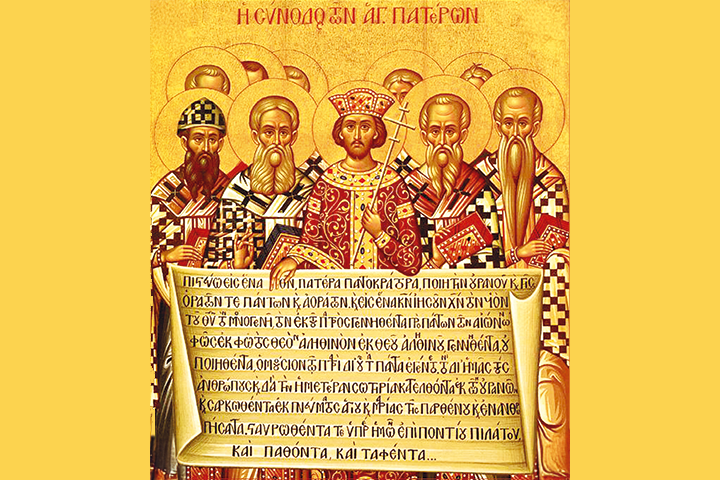"Do You Believe This?" (John 11:26)
Week of Prayer for Christian Unity 2025

In 2025, the Week of Prayer for Christian Unity offers a special opportunity to reflect on our shared faith. The commemoration of the 1700th anniversary of the first Christian Ecumenical Council, held in Nicaea in 325 AD, provides a unique occasion to revisit the roots of our faith and explore its relevance in today’s world.
The Council of Nicaea: A Shared Faith
Convened by Emperor Constantine, the Council of Nicaea brought together 318 Church Fathers, mostly from the East. This historic event marked a pivotal step in unifying the Christian faith, expressed in the Creed. This text, later revised at the Council of Constantinople in 381, became the doctrinal foundation that continues to unite Christian Churches. Despite the cultural and political differences faced by Christians in the 4th century, the Creed succeeded in consolidating a common profession of faith, uniting communities under the affirmation “We believe.”
This year, 2025, offers a historic coincidence: the Churches of the East and the West will celebrate Easter on the same date, April 20. This liturgical unity is a hopeful sign on the journey toward greater communion among Christians.
The Theme of the Week: “Do You Believe This?”
The biblical text guiding this week is John 11:17-27, centered on the powerful dialogue between Jesus and Martha in Bethany. Confronted with the death of her brother Lazarus, Martha expresses both her sorrow and her faith in Jesus, who declares: “I am the resurrection and the life” (Jn 11:25). The question Jesus asks Martha, “Do you believe this?” (v. 26), not only challenges her personal faith but also that of all Christians across the centuries.
This dialogue invites us to reflect on our own response to faith in Christ. Just as the Fathers of Nicaea sought to express the mystery of the incarnation and the resurrection, we are called today to bear witness to this same faith, a source of hope and joy, and to share it with the world.
An Ecumenical Celebration of Faith
In the context of this commemoration, the Week of Prayer emphasizes the personal and communal dimensions of faith: “I believe” and “we believe.” The celebration includes a dialogue proclaimed by three readers and the assembly, inspired by the conversation between Jesus and Martha. Participants receive a candle, symbolizing the light of the risen Christ, and recite the Nicene Creed together.
The prayers of intercession, based on patristic writings, invite us to grow in faith and to bear witness together to God, Father, Son, and Holy Spirit. The celebration concludes with the Lord’s Prayer and a blessing, sealing a moment of profound communion.
A Call to Unity
This anniversary of the Council of Nicaea reminds us that unity in faith does not mean uniformity, but rather a deep communion that respects diversity. In this spirit, the Week of Prayer for Christian Unity invites us to rekindle our living heritage, celebrating together the apostolic faith that unites us and moves us forward as one body in Christ.
The prayers and reflections for this week were prepared by the brothers and sisters of the monastic community of Bose, in northern Italy.
Visit the following link for more information:
http://www.christianunity.va/content/unitacristiani/en/news/2024/2024-01-03-spuc-2024-a-rome1.html
Origin of the Week of Prayer for Christian Unity
The Week of Prayer for Christian Unity began as an initiative in which different Christian denominations joined together in prayer, seeking to achieve the full unity of the Church. This practice responds to Jesus’ call in His prayer for the unity of His disciples, inviting us to unite with Him in asking for this gift.
Since 1968, the themes for each Week of Prayer have been jointly prepared by the “Faith and Order” Commission of the World Council of Churches and the Pontifical Council for Promoting Christian Unity, representing a significant ecumenical effort.
The ecumenical movement, which seeks to restore unity among the various Christian denominations separated by doctrinal, historical, traditional, or practical differences, counted among its pioneers Father Paul Couturier. His work inspired many religious communities to prioritize prayer as the path toward the visible unity Christ desires for His Church.
In 2019, Pope Francis invited the faithful to celebrate various events marking the twentieth anniversary of the Augsburg Agreement, signed in 1999 between Catholics and Lutherans on the doctrine of Justification. This agreement, considered a milestone in the history of ecumenism, has since been joined by other Churches and Christian Communions, symbolizing a living hope on the path toward mutual understanding and the full unity of all Christians in Christ.
